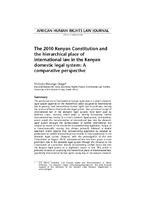The 2010 Kenyan constitution and the hierarchical place of international law in the Kenyan domestic legal system: a comparative perspective
Abstract
The prominent use of international human rights law in a state’s domestic
legal system depends on the hierarchical place occupied by international
law in general, and international human rights law in particular, among
the sources of law in that particular legal system. Two systems of receipt of
international law in the domestic legal systems have been used by
different states: monism, which looks to directly incorporate ratified
international law treaties in a state’s domestic legal system; and dualism,
which entails the transformation of international law into the domestic
legal system through the domestication of ratified international law
treaties by means of the enactment of parliamentary legislation. Kenya, as
a Commonwealth country, has always primarily followed a dualist
approach which requires that domesticating legislation be enacted by
parliament for ratified international law treaties to have application in the
domestic legal system. However, with the promulgation of the new
Constitution in August 2010, international law has been given a more
prominent role in the domestic legal system through the inclusion in the
Constitution of a provision directly incorporating ratified treaty law into
the Kenyan legal system as a legitimate source of law. This article is
primarily focused on analysing the hierarchical place of international law,
specifically international human rights treaty law, in the Kenyan domestic legal system in the context of the new constitutional dispensation. It
recommends that in order for international human rights law to have a
prominent place in the governance of the country, article 2(6) of the
Constitution should be interpreted progressively so as to give international
human rights law norms an infra-constitutional but a supra-legal status in
the domestic legal system. In this way, international human rights law will
act as a bulwark against recession to totalitarian rule, as well as safeguard
the democratic and fundamental rights protection gains that were won in
the struggle for constitutional change.

